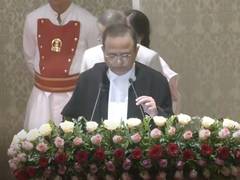Bill aimed at curbing ‘urban Naxalism’ re-introduced in Maharashtra assembly; CM stresses its need
Nagpur, Dec 18 (PTI) Maharashtra Chief Minister Devendra Fadnavis on Wednesday re-introduced the Special Public Security Bill in the state assembly, and said the proposed law is not aimed at suppressing genuine dissenting voices, but to close down the dens of urban Naxals.
The previous Maharashtra government led by Eknath Shinde had in July this year tabled this bill, named as ‘Maharashtra Special Public Security Act, 2024’, in the assembly during the monsoon session. However, it could not be passed at that time.
With the new government led by Fadnavis at the helm after the November 20 assembly elections, he re-introduced the bill in the House.
Speaking on the occasion, Fadnavis said the bill will be referred to the joint select committee of the state legislature so that all doubts related to it can be cleared.
Views of the stakeholders will be considered and the bill will be cleared in the monsoon session of the state legislature to be held in July next year in Mumbai, he said.
“Naxalism is not restricted to remote rural parts alone, but frontal organisations have come up in urban areas as well which work towards creating distrust about the country and its institutions,” Fadnavis said.
“Even the anti-Naxal squads in Maharashtra wanted such a law to stop the activities of urban Naxals. This proposed law is not aimed at suppressing genuine dissenting voices, but to close down the dens of urban Naxals,” he added.
Congress leader Nana Patole questioned the need for a separate Act when existing laws have provisions to tackle Naxalism.
To this, Fadnavis replied that Maharashtra does not have a law to tackle Naxalism.
“We have IPC (Indian Penal Code) and UAPA (Unlawful Activities (Prevention) Act). UAPA is for handling cases related to terror activities,” he said.
Fadnavis said Chhatisgarh, Telangana, Andhra Pradesh and Odisha have enacted Public Security Acts for effective prevention of unlawful activities, and banned 48 frontal organisations.
All offences under the proposed act will be cognisable and non-bailable. The offences will be investigated by a police officer not below the rank of a sub-inspector.
The bill describes unlawful activities as indulging in or propagating acts of violence, vandalism or other acts generating fear and apprehension in the public. Indulging in or encouraging use of firearms, explosives or other devices, encouraging or preaching disobedience to established law and its institutions is also an unlawful activity, it said.
An unlawful organisation is the one which indulges in or bets or assists, gives aid, encourages directly or indirectly any unlawful activity. Association with an unlawful organisation will see a jail term from three to seven years and a fine of Rs 3 to Rs 5 lakh, it said.
An advisory board will decide whether or not there is sufficient cause for declaring an organisation as unlawful. It will submit a report to the government in three months.
All offences shall be registered under the written permission by an officer not below the rank of deputy inspector general of police who shall also specify the investigating officer who shall investigate the case.
No court shall take cognisance of any offence except on the report of an officer not below the rank of additional DGP, as per the provisions of the bill.






